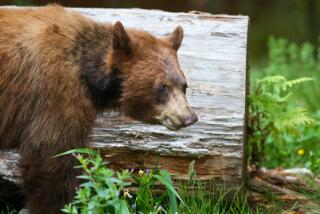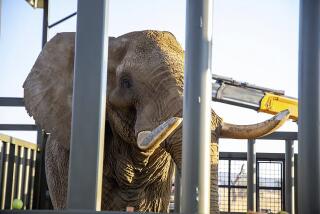Oakland Zoo’s 11-Month-Old Elephant Dies
Kijana, the baby African elephant that the Oakland Zoo spent the last 11 months painstakingly hand-rearing, died suddenly early Monday morning from shock brought on by a bacterial infection in his intestines.
Nearly a year after zookeepers were surprised one morning by the appearance of the newborn elephant, they were just as stunned by his death.
“This elephant spiked a fever at 3 o’clock yesterday afternoon, and it was dead 12 hours later,” said Joel Parrott, the executive director of the zoo.
On Sunday morning, keepers noticed that Kijana “didn’t seem right,” he said. By the afternoon, he had a mild fever of 101 and Parrott instructed that Kijana, whose walks outdoors had become a popular attraction at the zoo, be taken “off exhibit.”
The zoo began to administer antibiotics and oral fluids and continued the treatment into the night.
As Kijana often did, he spent Sunday night nuzzling Colleen Kinzley, the zoo’s curator who became the elephant’s favorite night nurse and handler. About 3 a.m. he let out the low rumble that elephant handlers take as a sign of contentment and lay down. Kinzley thought he was falling asleep. When she realized he had stopped breathing, she called Parrott to the zoo.
“She was pretty distraught,” Parrott said of Kinzley. “It’s been hard for all of us, but this has been real hard on Colleen. She really bonded with that elephant.
“It’s very sad,” Parrott said. “We really just feel like we got burned. It’s not fair.”
Kijana--a Swahili word meaning “little boy”--was the first African elephant born in captivity in North America in 12 years. It’s a rare occurrence to have either an African or Asian elephant born in captivity, and few survive their first year, especially if they are deprived of the nutrients found in their mother’s milk.
From the moment that Kijana’s skittish mother, Lisa, kicked him away out of fear, the zoo spared no effort to raise him. A rotating staff of handlers and volunteers cared for the elephant around the clock, feeding him by bottle, cleaning up after him, baby-sitting him through the night and charting his every mood and activity.
Most important, the zoo tried to replicate the mother’s milk so crucial to an elephant’s upbringing, buying a specially made formula from a Canadian company and supplementing it with some real elephant milk they were able to obtain from another elephant at the zoo.
With the exception of a couple of mild bouts of diarrhea, Kijana appeared to be healthy, gaining about a pound or two a day. At the time of his death, he was drinking about 60 to 70 pints of formula a day, weighed about 625 pounds and stood 4 feet tall.
Kijana followed Kinzley around as if she were his mother, and on the several nights a week that she baby-sat him, he would reach over with his trunk to tweak her bangs.
“He loves hair,” Kinzley said last month about her young charge. “His trunk is stronger now and he has really good control of it. He’ll get hold of a little wisp of hair and almost yank it out of your head.”
Kijana was in many ways an overgrown baby. He woke up continually through the night demanding to be fed formula. But the head-butting that was playful at 300 pounds was dangerous at 600, so his trainers had gradually taught him to stop.
Recently the zoo provided Kijana with a sturdy four-legged playmate--a goat named Rafiki--but the elephant still preferred the company of humans.
Zookeepers had also begun to introduce Kijana to the female adult elephants, including Lisa, the mother who once spurned him. Handlers put Lisa in the barn, chaining her legs so she couldn’t harm the young elephant, and found her gradually more interested in Kijana. The zoo hoped that when it was time to merge Kijana with the rest of the adult elephants, Lisa might function as a protector if he needed one.
A couple of hours after Kijana’s death, Kinzley led Lisa down to the barn where her baby lay dead. There, Lisa gently fondled him with her trunk.
Kinzley assisted Parrott at a necropsy conducted Monday morning. According to Parrott, who is a veterinarian, the elephant was felled by a fast-moving bacterial infection that caused either septic or toxic shock. Parrott is awaiting lab results to determine what kind of bacteria killed the animal.
The elephant was probably more vulnerable to common bacteria because “he’s still young,” Parrott said, “and he’s on milk--which is a better medium for bacteria to take off on.” The zoo had tried with minimum success to supplement his milk formula diet with hay and grass roughage.
The Oakland Zoo, which had seen a surge in visitors since the arrival of Kijana, had been planning a big first birthday celebration. Instead, the elephant will be buried in the back of the zoo grounds, where other animals are buried.
More to Read
Sign up for Essential California
The most important California stories and recommendations in your inbox every morning.
You may occasionally receive promotional content from the Los Angeles Times.











